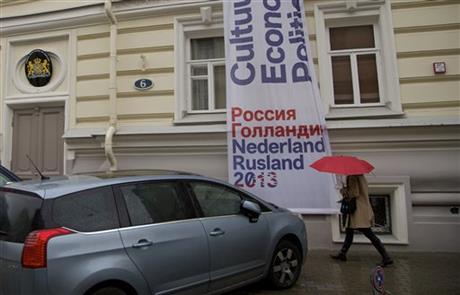
By LYNN BERRY
A woman walks past the embassy of the Netherlands in Moscow, Russia, on Wednesday, Oct. 16, 2013. A Dutch diplomat was beaten up by two unidentified men who barged into his apartment in central Moscow, an attack that threatened to further sour relations between the two countries following the arrest of a Russian diplomat in the Netherlands. (AP Photo/Ivan Sekretarev)
MOSCOW (AP) — A Dutch diplomat was beaten up by two men who barged into his apartment in central Moscow, an attack that followed the arrest of a Russian diplomat in the Netherlands and threatened to further sour relations between the two countries. Russia was quick to express its regrets on Wednesday, but the Dutch government said it expected a full explanation.
The Investigative Committee said Wednesday that it was working to identify and find the men who had knocked the diplomat to the floor and tied him up with tape. A news website with close ties to Russian law enforcement agencies reported that the attackers had posed as electricians.
While it was unclear who had assaulted the diplomat and why, several Western ambassadors in recent years have been subject to harassment that was seen as reflecting Kremlin anger at actions taken by them or the countries they represented.
Dutch Foreign Minister Frans Timmermans said in a post on his Facebook page that the diplomat was slightly injured in the assault on Tuesday night. Timmermans said he had summoned the Russian ambassador for an explanation.
“Our people have to be able to work safely, and I want guarantees that the Russian authorities will accept their responsibilities on that point,” the minister wrote. He did not name the diplomat.
The Russian Foreign Ministry identified the Dutch diplomat as Onno Elderenbosch, the deputy chief of mission at the Moscow embassy.
“In Moscow we express our regrets in connection with the deplorable incident,” Foreign Ministry spokesman Alexander Lukashevich said in a statement. He said Russian investigators would do everything possible to find those responsible.
The arrest of Russian diplomat Dmitry Borodin in The Hague on Oct. 5 caused outrage in Moscow. Timmerman later apologized to Russia, but he also defended the actions of the police who had arrested Borodin. Police have declined to comment on the incident. Dutch state broadcaster NOS reported that police had traced a car involved in an accident that day to Borodin’s home, and neighbors told police they were worried for the safety of the children inside.
The incidents involving the Russian and Dutch diplomats, both the No. 2 in their respective embassies, come at a time of growing tensions between the two countries over Russia’s seizure of a Dutch-flagged Greenpeace ship and Russia’s anti-gay laws.
Russia’s state television showed photos obtained by the news website Lifenews, known for having good sources in Russian law enforcement, that it said were taken inside the Dutch diplomat’s apartment, including one showing a heart written in lipstick on a mirror with the Russian letters LGBT beneath it. LGBT stands for lesbian, gay, bisexual and transgender.
The Dutch have been outspoken in their criticism of Russia’s anti-gay policies. In April, the Amsterdam mayor expressed his opposition by declining to meet with Russian President Vladimir Putin during his visit to the Netherlands. And in August, Dutch gay groups held a protest ahead of a major concert by Russian state musicians and dancers.
It was impossible to independently verify the authenticity of the photo.
Citing its sources in law enforcement, Lifenews described how the attack occurred: The diplomat returned home and found the elevator not working, so he walked up the stairs to his fourth-floor apartment, where he was met by two men dressed as workmen who were fiddling around in the electrical box in the stairwell. The men told him the power was out on the entire floor and asked if they could come into his apartment to check the electricity. As soon as the diplomat opened the door they pushed him to the floor, the report said.
The veracity of this report was impossible to determine, but no other account of the attack appeared on Wednesday.
The Netherlands and Russia chose 2013 as a year to celebrate historical ties, but it has been filled with tension instead.
The new Dutch king, Willem-Alexander, is due to visit Russia and meet with Putin in November, but some in the Netherlands suggest he should reconsider.
Dutch Prime Minister Mark Rutte told reporters at Parliament that he wants to establish the facts of the attack in Moscow as soon as possible and would not speculate about the king’s visit to Russia.
“What has happened is extremely serious,” he said. “But first we need to get the facts on the table.”
The top Dutch gay rights organization, COC, condemned the attack.
“It is terrible for the person involved and appears to be another expression of the swiftly deteriorating climate for LGBTs in Russia,” COC chairperson Tanja Ineke said in a statement. She urged the king to go ahead with his visit to Russia and to raise the issue of human and gay rights with Putin.
In past years, the ambassadors of Britain and Estonia faced harassment from members of a Kremlin-backed youth group. Former British Ambassador Anthony Brenton was hounded in 2006 after he spoke at a Russian opposition gathering, while former Estonian Ambassador Marina Kaljurand was targeted in 2007 as Russians heatedly protested the removal of a Soviet war memorial from the center of the Estonian capital.
The current U.S. ambassador, Michael McFaul, has been harassed by crews from a Kremlin-friendly television station. Since the television crews have confronted him unexpectedly and appeared to know his private schedule, McFaul has suggested that they were tipped off by Russian security agents monitoring his emails and phone calls.
___
Associated Press writer Mike Corder in The Hague, Netherlands, contributed to this report.



